The testimonial novel as a Bildungsroman
figurations of violence and cruelty in the work Memórias de um sobrevivente, by Luiz Alberto Mendes
DOI:
https://doi.org/10.52521/21.8350Keywords:
Romance Testemunhal, Romance de Formação, Romance Brasileiro Contemporâneo, Luiz Alberto MendesAbstract
Why does it narrate suffering in the form of memories, (auto)biographies or from other records, such as novels? In addition to the effort to elaborate on suffering and violence, it can be noted that the testimony can be part of the construction of meaning to past events, which does not mean the faithful reconstitution of the events, the participants (victims, perpetrators and witnesses), the scenarios etc., but the different ways in which violence and suffering are treated, figured and signified.
Based on these assumptions, we analyzed the book Memórias de um sobreviventer, by Luiz Alberto Mendes, in which the author's “penal career” as a criminal is presented. We intend to demonstrate that the testimonial novel, in specific cases like this, also presents itself as a kind of Bildungsroman: not as the education of the typical, model bourgeois individual, enshrined in Goethe's Wilhelm Meister’s Apprenticeship, but the education of the subalternized individual, product of a peripheral capitalist society marked by deep inequalities, exclusions and all kinds of violence.
References
ARMSTRONG, Nancy. A moral burguesa e o paradoxo do individualismo. In: MORETTI, Franco (Org.). A cultura do romance. São Paulo: Cosac Naify, 2009.
DUNNING, Eric; MENNELL, Stephen. Elias on Germany, Nazism and the Holocaust: On the Balance between ‘Civilizing’ and ‘Decivilizing’ Trends in the Social Development of Western Europe. The British Journal of Sociology, v. 49, no. 3, pp. 339-357, September 1998.
DURKHEIM, Émile. Educação e sociologia. São Paulo: Melhoramentos, 1972.
ELIAS, Norbert. O processo civilizador. Volume 1: Uma história dos costumes. Rio de Janeiro: Jorge Zahar, 1994.
ELIAS, Norbert. Os alemães. A luta pelo poder e a evolução do habitus nos séculos XIX e XX. Rio de Janeiro: Jorge Zahar, 1997.
FERNANDES, Florestan. A revolução burguesa no Brasil: Ensaio de interpretação sociológica. Curitiba: Kotter Editorial; São Paulo: Contracorrente, 2020.
FRANCO, Jean. Si me permiten hablar: la lucha por el poder interpretativo. In: BEVERLEY, John & ACHUGAR, Hugo Eds.). La voz del otro: testimonio, subalternidad y verdad narrativa. Lima: Latinoamericana Editores; Universidad Rafael Landívar, 1992.
GINZBURG, Jaime. Crítica em tempos de violência. São Paulo: Edusp, 2012.
GNONE, Sergio. Dizer as emocões - A construção da interioridade no romance moderno. In: MORETTI, Franco (Org.). A cultura do romance. São Paulo: Cosac Naify, 2009.
JAMESON, Fredric. De la sustitución de importaciones literarias y culturales en el tercer mundo: el caso del testimonio. In: BEVERLEY, John & ACHUGAR, Hugo (Eds.). La voz del otro: testimonio, subalternidad y verdad narrativa. Lima: Latinoamericana Editores; Universidad Rafael Landívar, 1992.
LEENHARDT, Jacques. A construção da identidade pessoal e social através da História e da Literatura. In: LEENHARDT, Jacques & PESAVENTO, Sandra Jatahy (Orgs.). Discurso histórico e narrativa literária. Campinas, SP: Ed. Unicamp, 1998.
MARCO, Valeria de. Literatura de testemunho e a violência de estado. Lua Nova, São Paulo, no. 62, 2004, pp. 45-68.
MENDES, Luiz Alberto. Memórias de um sobrevivente. São Paulo: Companhia das Letras, 2009.
MORETTI, Franco. O século sério. In: MORETTI, Franco (org.). A cultura do romance. São Paulo: Cosac Naify, 2009.
PASSIANI, Enio. Past and present in sociological theory: some similarities and differences between Émile Durkheim and Norbert Elias. In: DÉPELTEAU, François & LANDINI, Tatiana Savóia (Eds.). Norbert Elias & Social Theory. New York: Palgrave Macmillan, 2013.
RODRIGUES, Geise Mara & MARTINEZ, Viviana Velasco. A narrativa testemunhal e o enredamento do traumático no psiquismo. Rev. Latinoam. Psicopat. Fund., São Paulo, v.17, no. 4, pp. 858-871, dez. 2014.
Downloads
Published
How to Cite
Issue
Section
License
Copyright (c) 2023 Enio Passiani, Gabriele dos Anjos

This work is licensed under a Creative Commons Attribution 4.0 International License.











